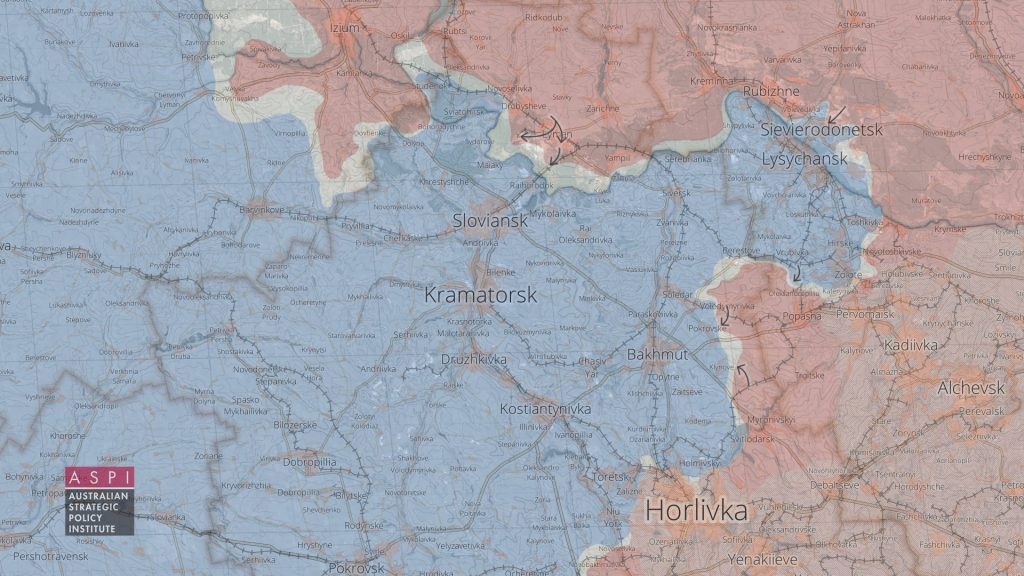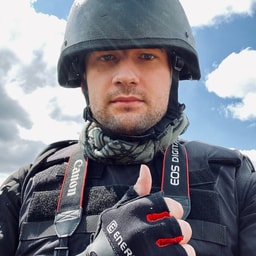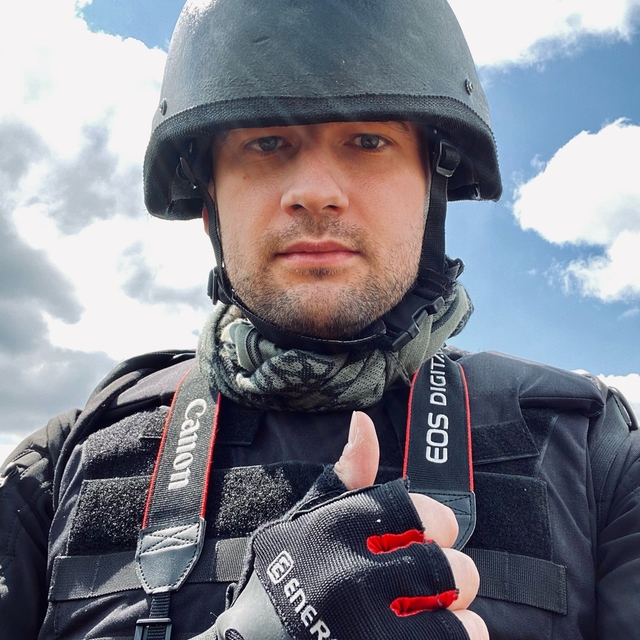'Welcome to hell': Ukrainian airborne fighting Russia in Donbas woods

SLOVIANSK, Donetsk Oblast — The battlefield stretches through the dense forest on the banks of the Siversky Donets River.
Soldiers with Ukraine’s 79th Airborne Brigade crawl out of sandy trenches, preparing their 40 mm under-barrel rounds.
Barrels up, they aim at an imperceptible enemy line running some 300 meters away, hidden behind a wall of tall pines.
“Three, four, fire!”
The ensuing whistle and blast merge with the never-ending thunder of artillery barrage on either side.
“Those f*cks should know we’re still here and ready,” the paratroopers say as they lay down their weapons to rest and seek cover.
Here, as in many other parts of Donbas, Ukrainian fighters rarely see their enemies' faces.
The largest and bloodiest battle in Europe since World War II is, in many ways, a cutthroat duel between Russian and Ukrainian artillery. Russia has a clear numerical advantage in this fight, gradually securing its gains by eliminating the Ukrainian lines that stand in its way.
The decisive battle has been going on for nearly 40 days. Russia is slowly and painfully pressing through Ukrainian defenses, turning villages to ashes in its wake.
Now, amid recent progress by Russia, the situation in the region is reaching a critical point.
Despite heavy losses, Ukraine's military continues to fight hard, trying to wear out Russian forces. Surprisingly, given the circumstances, morale remains high among Ukrainian troops.

The river war
The 79th Airborne Brigade is holding the line in terrain that is quite localized within Donbas -- the densely forested pine woods of northern Donetsk Oblast.
The area was once very popular for its numerous holiday resorts and summer getaways.
These days, children's summer camps harbor weary troops between battles and cottages once frequented by vacationers are used as frontline strongholds.
The 79th fire support company has dug its trenches in the deep forests south of Lyman, a key city that has been hit hard by Russia's war.
Little villages within several kilometers of the front line have since been abandoned.
The zone of action welcomes those who venture near with the phrase "WELCOME TO HELL" written in large Russian script by Ukrainian soldiers across a shrapnel-riddled metal fence. Scores of Uragan missile tails peeking up from the ground get the mood across.
In late May, the fierce battle waged in Donbas turned grim as Russia managed to deploy fresh reserves and amp up the pressure on already-depleted Ukrainian forces.
Russia has, over the past few weeks, largely abandoned its axis near the city of Izium, Kharkiv Oblast, and concentrated on areas at the border of Donetsk and Luhansk oblasts, as well as on the northern bank of the Siversky Donets River.

Rather than trying to encircle the entirety of Ukraine's military in the east, Russia was forced to suppress its appetite by instead isolating and destroying smaller pockets of troops.
After over a month of stalled offensives, Russian forces have finally managed to make steady progress in the southeast near the ruined community of Popasna, Luhansk Oblast. Russian forces have compromised the key T1302 highway (nicknamed "the road of life"), which connects the twin cities of Sievierodonetsk and Lysychansk in Luhansk Oblast with Donetsk Oblast.
Russia now keeps the principal Ukrainian supply line under fire control and threatens to cut it off completely.
A continuous onslaught of Russian forces from the north has also pushed weary Ukrainian defenses towards the banks of the Siversky Donets River. Following Russian airstrikes and a massive artillery barrage on Lyman, Ukrainian forces have had to retreat south again.
Continuous attempts by Russia to cross the river and merge with the Popasna axis raise fears of a large Ukrainian group getting cut off in Sievierodonetsk-Lysychansk.
However, the latest developments indicate that the Ukrainian command decided to reinforce the Sievierodonetsk garrison, rather than withdraw. Russia has to get through over 20 kilometers of fighting to close the pocket.
Large Ukrainian forces, including the 79th Airborne units, are maintaining the defense in the forests of Siversky Donets that comprise the Holy Mountains National Nature Park, fighting hard to prevent Russian forces from crossing the river.

Burning skies
The 79th's anti-tank unit's trenches have an extensive arsenal of western-provided anti-tank weapons.
Swedish-made 84 mm AT4s, American M141s (SMAW-Ds), widespread British NLAWs, and rarer RGW-90 MATADORs, all lean against the earthen trench walls next to machine guns pointed against the deep forest.
“Our big regards to taxpayers giving us these toys,” the paratroopers laugh.
“This forest has a lot of destroyed Russian vehicles if someone wants an illustrated cost performance report.”
May 9, the day on which Russia commemorates the Allied victory of World War II, was believed to have been Russia's deadline for its success in Donbas and the company witnessed the most savage Russian assault in weeks.
A large Russian party led by a BTR-80 personnel carrier appeared from behind the cover of trees and engaged in a frontal attack on the 79th’s trenches.
“That was a sort of their weird way to celebrate the May 9,” says Ukrainian soldier Maksym Chuprun.
“We thought we’d be done here. But some of us here, including myself, started running here and there all the time behind the machine guns and opening fire all the time. We were just trying to make an impression of a far larger force standing here.”
“And it worked! We were hearing them shouting on their comms: ‘Shit, there are 60 of them here!’ But in reality, there were just a handful of paratroopers.”

The Russian attack failed: The 79th’s airborne damaged the Russian BTR with a SMAW-D (which is not supposed to be used as an anti-tank weapon in the first place) and some 70 meters away a couple of RPG-18 Mukha shots finished off the vehicle.
After having sustained losses, the Russian infantry retreated into the woods under crossfire.
This incident is just one of many treacherous moments during the war. What lies ahead is an even more brutal fight, as Russia has done everything possible to squeeze Ukrainian forces from the river banks toward Sloviansk and Kramatorsk, the region’s main fortresses.
Artillery barrage on the flanks, meanwhile, never stops.
Once every 10 to 15 minutes, the thunder of artillery fire gets so intense that even the most battle-hardened troops are on alert. Russian BM-21 Gran missile systems splutter constantly, barraging distant Ukrainian lines.
“That’s just nothing,” the soldiers say. “In the night, the sky is shining bright here sometimes because of artillery.”

Blood on the truck
Luckily, the distant strikes do not get any closer.
Time moves slowly. Every four-hour combat shift takes place behind machine guns with cigarettes in hand, silent, straining endlessly to catch a glimpse of potential enemies hidden in the distance.
Reprieve is granted as a new set of heavily geared paratroopers carrying anti-tank tubes on their shoulder emerge from the forest -- it’s shift change.
Troops off shift can finally return to the abandoned basements where they have been sheltering for some cheap coffee, canned meat, and hopefully a few hours of sleep on a mattress in a dark corner with a pair of earphones in.
The comms are buzzing at all times in the semi-darkness, issuing warnings about Russian drones scanning their sector.
“Orlan-10 has been spotted, disguising mode on,” a radio set buzzes.
“Plus,” soldiers say, giving the standard reply.

“You know, when Russians ask for a peace treaty, we should make it one of the conditions that they replace the word “orel” (“eagle”) with the word “kozel” (“goat”),” says a paratrooper, spreading canned meat on a slice of bread with a knife. “So they will have to call their drones not Orlan but Kozlan. I just hate those things.”
In these parts, Orlans are the grim messengers of Russian artillery.
Even in the rear shelters, soldiers keep their rifles close at hand, sometimes even hugging them to their chest as they take a nap.
“You could see those huge rusty stains on the bottom of my Ford pickup truck,” says a battalion deputy leader, sipping hot Nescafe from a plastic cup and mixing it with cigarette smoke in the dark.
“Well it’s not rust. It’s the blood of a Russian soldier. We took him the other day when a Russian squad tried to attack us here in the night. They thought we were an Alpha Spetznaz group or something and got out. They left this young dude behind, injured.”
“We tried to talk to him. He was 20, maybe 21. He only managed to say that his name was Vadim, he served with the 15th Guards Motorized Rifle Brigade, and that his unit’s main mission in the area was to just get entrenched and wait.”
“But that was it — he kicked the bucket in my truck as I was trying to evacuate him.”













